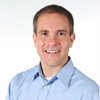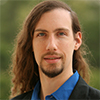
|
Jun Allard Cells are nanometer-scale problem-solving machines. The broad goal of the Allard group is to understand how components inside cells push, pull, bend and flow together, and how this helps cells perform tasks and exploit problem-solving strategies. We use mathematical and computational modeling, in collaboration with experimentalists at UC Irvine and around the world. Our primary focus is the cell-cell interface that dynamically forms between immune cells (T cells) and other cells, where forces and stresses on surface molecules have been demonstrated to affect immunological decision-making. The mathematical models we develop involve stochastic partial differential equations and allow us to use experimentally accessible information, like fluorescence intensities, to infer mechanical information like the tension on receptors and ligands |
 |
Ioan Andricioaei Theoretical and computational topics at the interface between structural molecular biology and physical chemistry. We apply numerical simulations and modeling methods to describe biologically important molecular processes in a variety of biological systems such as DNA-binding machines. |
 |
Shane Ardo The central theme of the Ardo Group’s research program is to understand and control photoinduced reaction mechanisms at interfaces, with the goal of maximizing energy-conversion efficiency for realistic applications. The Ardo Group will design and control interfacial asymmetry through synthesis, engineering, and modeling of the molecule–material structures for solar energy conversion. The photoelectrochemical and photophysical properties of hard and soft material interfaces will be manipulated via molecular functionalization, electrostatic engineering, and physical protection. The results of each study will be pertinent to fundamental electrochemistry and charge-, energy-, and ion-transfer phenomena. |
 |
Kieron Burke We are a small interdisciplinary group of research chemists and physicists, dedicated to spreading the use of density functional theory (DFT) throughout the known universe, but particularly in chemistry, physics, materials science, and nanoscience. We mostly develop methodology, but also collaborate with excellent groups both within and beyond UCI on novel applications. Some recent and ongoing projects include electron-molecule scattering using time-dependent density functional theory, atoms and molecules in strong laser fields, and transport through single organic molecules. |
 |
Carter T. Butts My group’s research centers on mathematical, computational, and statistical modeling of systems with complex patterns of dependence. We have a particularly strong focus in the area of networks, with an emphasis on sampling and network inference, network dynamics, models for graph populations, and exponential family random graph models (ERGMs). We also work on various problems in computational and Bayesian statistics, including Bayesian model integration for prediction of protein properties related to aggregation propensity and statistical models for protein chemical shifts. More broadly, we are interested in developing and applying Bayesian and/or network analytic methods to problems in physical, biological, or other settings that have not been studied using these techniques. |
- YouTube
- Google+
ChaMP Graduate Program
4129 Reines Hall
UC Irvine
Irvine, CA 92697
4129 Reines Hall
UC Irvine
Irvine, CA 92697
